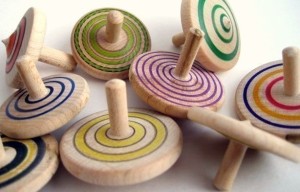 One day in a Lutheran church in Texas, a miracle happened.
One day in a Lutheran church in Texas, a miracle happened.
I had taken my baby daughter on a trip to see my mother, a trip carefully timed for one of the rare “good weeks” during a punishing course of chemotherapy. At seven months old, my daughter would be baptized. The faith was not my own; it was not my husband’s. All things considered, that mattered not one whit. The baptism was a gift. But it was not the miracle.
During the middle of the service, I took my restless girl into the church nursery. There, bobbling in the middle of the room was a contraption known to cognoscenti as a baby saucer. This was not the kind of thing that would ever land on my wish list. I thought they were hideous and huge, and I could not imagine giving up half of my living room to yet another baby thing, especially one combining all the crude amusements of a video arcade: garish colors, spinning balls, whizzers and bells. Then the miracle happened: Georgia liked it. I thought to myself: Hallelujah! I want to make her happy.
Home again, I went straight away to Sears and charged the $60 model. I impressed upon my husband the urgency of assembling it that night. He did; we rearranged the furniture.
She never willingly sat in it again. Oh, I’m sure there was a time or two. In a pinch, I would plop her there for the half-second before her screaming began. I thought: Maybe I should get the $99 one.
This was my first experience with the rule called Other People’s Toys. The emphasis is on the “other.” You like them precisely because they are not yours. The corollary to this rule is Other People’s Kids, precocious and polite, who make you think: Why can’t my kid be more like that?
We held onto the baby saucer for a while and then priced it to sell at a garage sale. I hope it delivered hours and hours of saucer happiness and satisfaction to generations of families thereafter. For me, it was the beginning of an up-close analysis of human desire as expressed by Georgia. What I saw was that her desires were spontaneous, impermanent and never-ending. Just because she wanted something now only meant that she wanted something now. Desires change. Satisfaction eludes. That’s what it means to be human, with infinite, insatiable desires. It’s not about the saucer! It did start me thinking: I want to have a separate playroom.
I tried to keep the big picture in mind when we went to Other People’s Houses and played with Other People’s Kids and Other People’s Toys. I’d see Georgia clutch something, somebody else’s something, with the fervor of new car fever. I didn’t have to buy it. She didn’t have to own it. It would probably never come up again. Desire comes up again and again, you see, not the momentary object of desire. Still, I thought: I wish she could learn to share. read more


